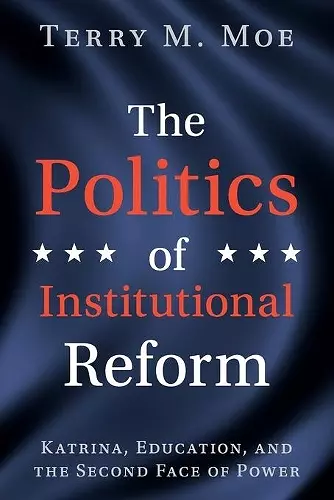The Politics of Institutional Reform
Katrina, Education, and the Second Face of Power
Format:Paperback
Publisher:Cambridge University Press
Published:5th Sep '19
Currently unavailable, and unfortunately no date known when it will be back
This paperback is available in another edition too:
- Hardback£39.00(9781108481151)

Treating Hurricane Katrina as a natural experiment, Moe explores New Orleans' education reform to reveal how political power shapes efforts to fix failing institutions.
Treating Hurricane Katrina as a natural experiment, Moe explores education reform to reveal how political power shapes and stifles efforts to fix failing institutions. Because the post-Katrina reforms proved revolutionary, this book will interest researchers and students in American politics, education, public policy, and theory of political institutions.In this ground breaking analysis, Terry M. Moe treats Hurricane Katrina as a natural experiment that offers a rare opportunity to learn about the role of power in the politics of institutional reform. When Katrina hit, it physically destroyed New Orleans' school buildings, but it also destroyed the vested-interest power that had protected the city's abysmal education system from major reform. With the constraints of power lifted, decision makers who had been incremental problem-solvers turned into revolutionaries, creating the most innovative school system in the entire country. The story of New Orleans' path from failure to revolution is fascinating, but, more importantly, it reveals the true role of power, whose full effects normally cannot be observed, because power has a 'second face' that is hidden and unobservable. Making use of Katrina's analytic leverage, Moe pulls back the curtain to show that this “second face” has profound consequences that stifle and undermine society's efforts to fix failing institutions.
'A groundbreaking contribution. By creatively leveraging Katrina's impact on New Orleans education reform as a natural experiment, Moe generates fresh insights into the role of power in sustaining poorly performing institutions and sheds new light on society's potential for problem-solving and real reform. A must-read.' Eric M. Patashnik, Brown University, Rhode Island
'Beautifully written, rich in descriptive detail, and propelled by a singular idea, The Politics of Institutional Reform packs a punch. This isn't just a book about education reform. It is a book about all public policy all the time: about how vested-interest power prevents society from fixing its institutions - and how, when that power is swept away, reforms once deemed heretical can become commonplace.' William Howell, University of Chicago
'Terry M. Moe uses the case of Hurricane Katrina to generate fundamental insights into the politics of institutional reform. Moe demonstrates how the 'second face of power' ordinarily allows vested interests to stifle major reform, and shows how institutional politics are transformed when their power is disrupted. A must-read for anyone interested in understanding the dynamics of institutional stability and change - and the challenge of fixing failing institutions.' Eric Schickler, University of California, Berkeley
'Terry M. Moe uses a theorist's insight to cut through the clutter surrounding New Orleans' school transformation. As he shows, smart pragmatists like Paul Pastorek can do sensible things, but only when the guardians of the status quo lose their blocking power. The result is a novel and revealing analysis of how power shapes the prospects for institutional reform.' Paul Hill, Center for Reinventing Public Education, University of Washington
ISBN: 9781108740388
Dimensions: 229mm x 150mm x 12mm
Weight: 350g
176 pages